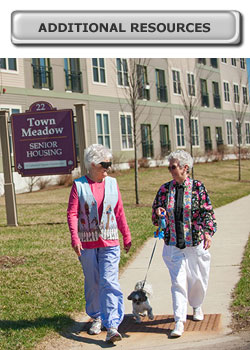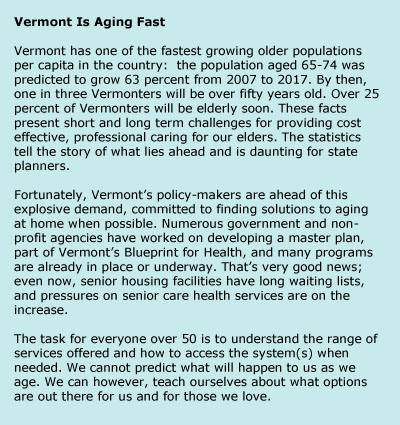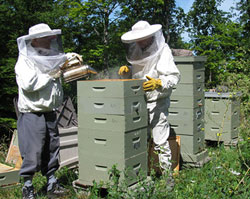Seniors Aging At Home Or In Home-Like Communities
by Jeanne Kern
|
|
| Publisher's Note: Our feature below is anecdotal. It reveals the anxiety that occurs when one waits until health is compromised to begin the process of researching senior living options. Most wait; but we urge you to do your homework now. You may never have to change your housing situation, but as we all know, the Girl Scout motto still holds. Be prepared. Always have a Plan B, plus another backup Plan C. The payoff is inner peace for you, and for those who love and care about you. |
|
Thirty-five years after she left her childhood home in Montpelier as a young woman, Evelyn Webler returned there to live. She rambled through its 11 rooms, writing poetry, visiting friends, and enjoying life for 20 years. Then she fell, and life changed.
No longer able to climb stairs or care for the large, beloved house, Webler didn't know what to do. She ultimately took her daughter's advice: "Every day, think of something you don't want to do. Eventually you will narrow it down to discover what you want or need to do."
"I think that is wonderful advice for any decision," says Webler, now 78. "Well, I knew I didn't want to live with my kids. I didn't want to leave Vermont. I didn't want to live in another town, although family had asked. I realized I didn't want to leave Montpelier. Then, pretty soon, I had an option."
An apartment at Pioneer Apartments, an affordable independent living community for seniors in Montpelier, became available, and she moved in four years ago. "And I've been very happy here," concludes Webler. |

|
Where to begin
Ask people where they want to live in their old age, and overwhelmingly the answer is "at home." Indeed, that is where most do live. According to the U.S. Administration on Aging, only 4.1 percent of the age 65 plus population in 2009 lived in an institutional setting, such as a nursing home. This figure increases to 13.2 percent for those over 85. But where is home for most older Americans?
Many elders continue to live in their own houses, giving little thought to the future. But living at home may not be the only good long term choice, as problems in mobility and personal care needs may arise. Just because you are fit and healthy, and able to maintain your own house, doesn't mean that you necessarily want to mow the lawn, and fix the roof. And even if you can no longer climb stairs or prepare your own meals doesn't necessarily mean you cannot remain in your house. However, in either situation, you do need to realistically consider how you are going to pursue what you want.
Begin by assessing what you have, and asking yourself what you want or need. Or like Evelyn Webler, think about what you definitely DON'T want. The sooner you start thinking, planning and reviewing your finances, the better your chances of achieving the housing arrangement you want.
Talking to an options counselor at one of Vermont's five Area Agencies on Aging can help with your decision-making process. Options counselors can be reached by calling the statewide Senior Helpline at 1-800-642-5119. They will help you explore various housing and healthcare options starting with an assessment of your situation and needs. Options counselors, explains Beth Stern, executive director at Central Vermont Council on Aging, "help seniors have the information to make decisions that are right for them." Circumstances vary, and Sterns says that agencies on aging will not tell you what to do—but they will help you to understand and work with available options in your area, when you want them.
Besides living in your own house, there are numerous housing options for older adults: independent living communities with residential care, assisted living communities, continuing or life care and homecare, and home sharing. |
 |
Independent Living
with Residential-Care Option
Independent living communities offer housing which may include either apartments and or cottages that are designed and customized for older adults. Residents are still active, with the freedom to come and go as they choose. They mostly care for themselves but have a number of services available including one meal a day, recreational social activities, transportation, and housekeeping. In addition, communities also offer a residential care unit on site with full time nursing available for those who can no longer take care of themselves. Some, such as the Lodges at Otter Creek in Middlebury or Shelburne Bay Care in Shelburne may also offer a memory care unit.
Older adults who choose independent living may want to "let go of all the responsibilities of upkeep of a home," says Dawn Provost, interim director at Westview Meadows, a private non-profit senior housing community in Montpelier. |
"They let it be someone else's worry, and move to a community setting that provides companionship and safety [so that] they can continue to do the things they enjoy." Independent/Residential Living communities such as Westview Meadows require a substantial entrance fee (approximately $200,000) as well as an ongoing monthly fee (approximately $2,000). According to Provost, the entry fee is equivalent to a lifetime lease on the apartment in the community.
Each apartment has a full kitchen so that residents can prepare their own meals. Community members have access to shared amenities such as a library, fitness room, dining room (one meal a day) and social activities. The monthly fees cover utilities and property taxes, home repairs and maintenance, grounds maintenance, weekly housekeeping and a main daily meal. Many residents may still own their own cars, although scheduled transportation is available.
If the resident becomes eligible and is accepted for a residential unit, 80 percent of the entrance fee is refunded when their apartment is re-occupied. The cost of a residential unit ranges from $4200-$5000 per month. Currently, there is a waiting list. A resident with a "lifetime lease" can be evicted, says Provost, "for non-payment of monthly fees, or when she can no longer live independently, and it becomes a safety issue." However, the resident and her family can privately pay to have caregiver services come in to provide necessary care to enable her to remain in the independent living apartment. This determination is made through a health screening and in conversation with the resident and her family members.
Many senior communities offer a higher level of care when needed, as well as independent living. At Westview Meadows, when a resident can no longer live independently, she doesn't have a guarantee that she will be able to move to what is called a residential care apartment. But she does "have a priority to one when it becomes available," assures Provost.
|
 |
Assisted Living
with Residential Care Living Option
Affordable assisted living housing, such as Heaton Woods and Pioneer Apartments in Montpelier or Cathedral Square in Burlington are owned and managed by local housing authorities or community non-profits. Polly Paulsen, 92, lived in a condo in downtown Montpelier, which kept her close to the community, her friends and the many projects in which she participated. But friends and family were concerned about her.
"I wasn't cooking or keeping house very well," Paulsen admits. "I got by until last spring. I got sick, and it knocked me out." The first stop was the emergency room, then on to rehab. From there she moved to Heaton Woods, an affordable residential care facility in Montpelier.
Assisted Living communities provide a higher level of services and care than in independent living communities.They offer personal-care assistance with dressing, coordination of medications and three meals a day, while enabling a resident to remain as independent as possible. Professional nursing assessments and care planning are provided. Health and fitness programs, social activities and scheduled transportation are available. While residents can leave the facility, as a safety precaution they do need to notify staff they are doing so.
The costs for assisted living differ, depending on whether a facility is a non-profit, public housing facility, or a private one. Montpelier's Heaton Woods offers one-room apartments with monthly fees based on a sliding scale for those with incomes under $32,000 a year. |
When asked if she was happy about her move from her condo to Heaton Woods, Paulsen replied, "It was absolutely necessary. And I've had so many happy surprises I can't begin to name them." But she does anyway: good food, wonderful staff and friends.
Being part of the decision-making process made it easier to make the change, says Paulsen. "Plus I knew I wasn't doing well in my condo." She adds that some people came against their will, and have found it hard to adjust. But she's had several adjustments in life, she says, not all pleasant, so that made it easier to cope.
|
Life Care Community
Wake Robin in Shelburne is Vermont's only life care community, (also known as a continuing care community) offering independent living cottages and apartments and "comprehensive, on-site health care for life." Continuing care options enable couples to remain together in the same community, even if they need differing levels of care.
As a Wake Robin resident, you pay a substantial one time entrance fee and ongoing monthly fee, which includes your choice of an apartment or cottage, all amenities and nursing care 24/7 if needed, at their onsite Linden Health Center. As a Wake Robin resident you'll pay the same monthly fee for life whether you are living independently or receiving nursing care in Linden Health Center. |

Residents at Wake Robin a "life care community," can pursue a wide variety of activities on site, including beekeeping!
|
Home Sharing
Often older adults find themselves alone in a large home in which they raised their families. They have too much space, but are reluctant to leave the homes they know and love. Home sharing offers an opportunity to share their home in exchange for companionship and help with expenses.
"People often don't understand home sharing. It's a loose definition," explains Christina Goodwin, director of Home Share Now (HSN), serving Central Vermont. (A second organization, HomeshareVermont, serves Chittenden County.) "It's up to the people involved to define it. There is no cookie-cutter home share. It's up to home sharers to mold it into their own shape."
For a $50 enrollment fee from home-seekers and home-providers, HSN works to create the right match for both parties; they charge a second fee of $100-$500 when a match is found. The fees cover background and reference checks, interviews and introductions, culminating in a two-week trial period with a draft agreement. At the end the trial period, if both parties remain in agreement, they go forward with making the match. Together, they create and sign a unique agreement, outlining further financial and household responsibilities.
According to Goodwin, home sharing "requires independence and problem-solving skills" on the part of the home-sharer, as Norma Raymond, 89, of East Montpelier, discovered. She decided to give home sharing a try after she had had several major surgeries. Her son didn't want her to live alone, yet Raymond wanted to remain in her home in the country.
Her first match didn't work out as she had hoped. If you encounter problems during the match, says Raymond, "You have to speak up, and say what isn't good about it."
The process for Raymond was similar to Evelyn Webler's: discovering first what she didn't want. "It was a good experience to go through, even though it didn't work out," Raymond says. She was game to try again; her next home-sharer "was a true gentleman who treated me like his mother."
It doesn't end with the match. HSN provides follow-up through regular check-ins. An on-staff mediator is on hand to help sharers resolve problems, and even to amend the original agreement if necessary. Goodwin says that the average length of a home share is one and a half years. Home shares come to a natural end when the home seeker finds a job, or moves on to the next phase of life. This is how Raymond's second home share ended. Sometimes the match no longer works for either partner. Or the home-provider moves to assisted living, a nursing home or dies.
HSN also provides information and mentoring to those who have a "pre-arranged match" with friends, and want to give home-sharing a try. According to Goodwin, "95 percent of those in matches say that home sharing has allowed them to live how and where they want to."
Transitional Decision
As Vermont's aging population grows, so will its housing options, especially programs and funding that will enable more and more elderly to age at home. Whichever option you choose, it can be a life-changing decision. Moving to a new home or new town is stressful for a person of any age. The emotions and logistics involved in moving are even more challenging if you have a lifetime of living and of memories to sort through as you downsize and move into unfamiliar living quarters.
But an ending can also be embraced as a new beginning. It all depends upon your attitude, and having a voice in your choices. So anticipate the future. Consider your options while you still have the time and the ability to make the choice right for you.
That's what Norma Raymond did. "Most people don't think beyond retirement. Over 30 years ago, I began thinking about where do I want to live when I'm 95," she shares, reflecting one of the reasons she is a member of the Governor's Commission on Successful Aging. "There's a lot more life, more years, than you think," she says. Back when she could still ride her horse, she would visit the highest point on the land where she has now lived for more than 60 years, and think, "This is for me."
So that's where she built her house "for growing old in" with everything on one floor, and she added ramps "just in case." And there she has lived for 25 years, still exploring supports that will allow her to stay there.
In case you cannot stay in your home, having options and getting prepared now, will avoid heartache and upset later on. Planning now will make any future transition or adjustment easier to bear, and ensure you stay safe and secure. The good news is that only three percent of Vermonters 65 and older require the most serious level of help, nursing home care; and thanks to the many living options described here, of those 85 or older, only 12.5 percent of Vermonters require nursing home care.
|
|
|
| Writer Jeanne Kern coordinates the Family Caregiver Support Program at Central Vermont Council on Aging. www.cvcoa.org |
|